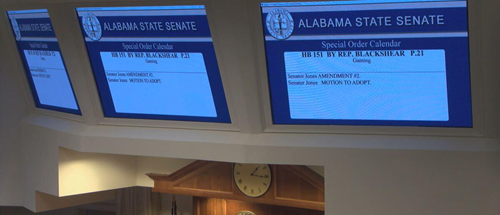The Alabama Senate has recently proposed a revised gambling bill that prioritizes the establishment of a state lottery and the creation of a new agreement with the Poarch Band of Creek Indians. This legislation steers clear of legalizing commercial casinos or sports betting within the state. If the bill is approved, Alabama residents will have the opportunity to cast their votes on the proposal in a special election scheduled for September of this year.

A State Lottery Takes Center Stage
The proposed bill places significant emphasis on the introduction of a state-run lottery system in Alabama. This move comes after numerous failed attempts in the past to legalize and regulate various forms of gambling within the state’s borders.
Supporters of the lottery argue that it would generate much-needed revenue for the state, citing the potential for funding education initiatives and bolstering infrastructure projects. They further emphasize that a state-sanctioned lottery would provide a safe and controlled environment for residents who already participate in gambling activities, potentially diverting them from the unregulated and potentially risky black market.
The Poarch Band of Creek Indians Seek a Renewed Agreement
Another key aspect of the revised gambling bill involves the Poarch Band of Creek Indians. The legislation proposes the establishment of a new deal with the tribe, which would effectively authorize the expansion of gambling operations on their sovereign lands. The Poarch Creek Indians already operate several casinos in Alabama, and this new agreement would potentially pave the way for the introduction of additional gaming facilities.
Opposition and Concerns
While the revised gambling bill has garnered support from some Alabama lawmakers and residents, it has also attracted its share of criticism. Opponents of the legislation express concerns about the potential negative social and economic consequences of the gambling expansion. They argue that increased access to gambling could lead to addiction problems, financial strain, and a rise in crime rates.
The Road Ahead for Alabama Gambling
The Alabama Senate’s revised gambling bill presents a significant development in the ongoing debate surrounding the legalization and regulation of gambling activities within the state.
The proposal prioritizes the introduction of a state lottery and a renewed deal with the Poarch Band of Creek Indians while excluding commercial casinos and sports betting. With a potential special election looming in September, the coming months will be crucial in determining whether Alabama residents will embrace this revised approach to gambling legislation.

Additional Considerations
It’s important to acknowledge that gambling can be a controversial topic, and there are strong arguments on both sides of the issue.
- Potential Benefits: Legalizing gambling is supported by arguments about its potential to boost economic growth, create jobs, and generate more income. They can also contend that, in contrast to the illegal market, regulated gaming offers a safer and more regulated environment.
- Potential Drawbacks: The legalization of gambling is opposed on the grounds that it could lead to societal issues like addiction, financial difficulty, and an increase in crime. They might also voice concerns about the effects of extensive gambling on society and culture.
Conclusion
The Alabama Senate’s revised gambling bill signifies a noteworthy step in the state’s ongoing deliberations over the legalization and regulation of gambling. The proposal focuses on a state lottery and a new agreement with the Poarch Creek Indians while omitting commercial casinos and sports betting. As the prospect of a special election in September draws near, the coming period will be a time of scrutiny and debate regarding this revised approach to Alabama’s gambling legislation.









